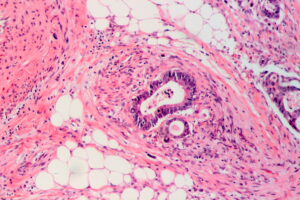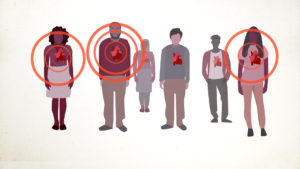A landmark study involving Oxford researchers has identified 69 previously unidentified genetic determinants of rare disease, including uncommon forms of epilepsy and schizophrenia. The multicentre research, led by Queen Mary University of London and including a number of researchers supported ... READ MORE
News for Genomic Medicine
Blood test developed to allow early detection of multiple cancers
Researchers at the University of Oxford have unveiled a new blood test – powered by machine learning – which shows real promise in detecting multiple types of cancer in their earliest stages, when the disease is hardest to detect. Named TriOx, this innovative liquid biopsy test analyses ... READ MORE
Oxford to play key role in two new MRC gene therapy centres
The Medical Research Council (MRC), part of UKRI, is launching its first two Centres of Research Excellence (CoRE), which will develop transformative new advanced therapeutics for currently untreatable diseases. Oxford is leading one of these centres and co-leading the other. Together, these ... READ MORE
Study reveals previously unknown genetic causes of colorectal cancer
A pioneering study has provided the most comprehensive analysis to date of the genetic make-up of colorectal cancer. The study, which was supported by the NIHR Oxford Biomedical Research Centre, involved the Universities of Oxford, Manchester, Birmingham, Edinburghand Leeds, The Institute of ... READ MORE
Hiding in plain sight: study identifies cryptic disease-causing genetic variants not detected by standard testing
Researchers in Oxford have identified types of genetic variants that lead to a range of rare disease but are not picked up by standard genetic testing. The team at the University of Oxford’s Centre for Human Genetics analysed whole genome sequencing data from the 100,000 Genomes Project. They ... READ MORE
Study highlights importance of ‘junk’ DNA in unlocking diagnosis
A new academic paper has revealed that areas of the human genome that are routinely overlooked in clinical tests may be the cause of some rare diseases. Assessing 122 patients with genetic conditions including rare forms of heart arrhythmia, brain inflammation, inflammatory bowel disease and ... READ MORE
Partnership with Danaher paves way for precision medicine test for sepsis
The University of Oxford today announced a partnership with Danaher Corporation to develop a new test to enable precision medicine care for sepsis, a pathological immune response to infection that accounts for one in five deaths globally each year. The test will build on research from the ... READ MORE
Genetic signals that cause ankylosing spondylitis uncovered
A study by University of Oxford researchers has uncovered the genetic signals that cause ankylosing spondylitis, a common form of spinal arthritis. The results of the study, published in the journal Cell Genomics, offer new hope to patients and their families, as they pave the way for the ... READ MORE
An open book? New genetic mutation linked to rare conditions
Researchers have discovered that a rare type of genetic variant can be responsible for two well-known skeletal disorders. Whereas many genetic conditions are caused by structural variations that involve deletions, insertions or duplications of segments of DNA, the scientists found that the ... READ MORE
National guidelines produced on use of genomics in treatment of IBD
National guidelines have been developed for clinicians on the use of genomics to diagnose and care for patients with monogenic inflammatory bowel disease (IBD), a group of intestinal disorders caused by variations in a single gene. The new guidelines, unveiled in an article in the Lancet ... READ MORE
Oxford researcher investigates genetic mechanisms of rare forms of asthma
An Oxford researcher has been awarded funding to expand her cutting edge research into the genetic mechanisms of rare and severe forms of asthma. Dr Anastasia Fries, NIHR Academic Clinical Fellow in Respiratory Medicine, was awarded a three-year MRC Clinical Research Training Fellowship worth ... READ MORE
Oxford receives major BHF award to research cure for inherited heart diseases
An injectable cure for inherited heart muscle conditions that can kill young people in the prime of their lives could be available within a few years, after an international team of researchers were announced as the winners of the British Heart Foundation’s (BHF) Big Beat Challenge. The BHF ... READ MORE
Three new Blood and Transplant Research Units created in Oxford
The NIHR has awarded three new Blood and Transplant Research Units (BTRUs) to the University of Oxford. The £20m programme, co-funded by the National Institute for Health and Care Research (NIHR) and NHS Blood and Transplant (NHSBT), are aimed at providing new technologies, techniques or ... READ MORE
First UK pilot study of newborn screening for spinal muscular atrophy launched
University of Oxford researchers have launched a pilot study to conduct routine testing of newborn babies for spinal muscular atrophy (SMA) for the first time. Every five days a baby is born in the UK with SMA. If treatments are delivered at birth, these newborns have the best chance of living ... READ MORE
BRC eye surgeons outline latest sight restoration approaches
Ophthalmologists from the University of Oxford have outlined the main sight restoration technologies currently being explored by leading eye surgeons. In an article published in Nature Biomedical Engineering, the authors, who are supported by the NIHR Oxford BRC, identified the major techniques ... READ MORE
Whole genome sequencing improves diagnosis of rare diseases, study says
A world-first scientific study has shown that whole genome sequencing (WGS) can uncover new diagnoses for people across the broadest range of rare diseases investigated to date and could deliver enormous benefits across the NHS. The pilot study of rare undiagnosed diseases, published today in ... READ MORE
Genetic study highlights links between IBS and mental health disorders
Research funded and supported by the NIHR has revealed that symptoms of irritable bowel syndrome (IBS) may be caused by the same biological processes as mental health conditions such as anxiety. IBS is a common condition worldwide, affecting around 1 in 10 people. The condition causes a wide ... READ MORE
Study uncovers gene that doubles risk of death from COVID-19
University of Oxford researchers have identified the gene responsible for doubling the risk of respiratory failure from COVID-19. Sixty percent of people with South Asian ancestry carry the high-risk genetic signal, which could partly explain the excess deaths seen in some UK communities, ... READ MORE
Blog: Identifying policy implications of personal genetic health information
Oxford BRC researcher, Dr Liz Ormondroyd, explains how she has been working with fellow academics and the UK Parliamentary Office of Science and Technology to identify policy implications of genomic health information. Genetics and genomics are increasingly in the news. People can buy genetic ... READ MORE
Genetic breakthrough to target care for deadly heart condition
University of Oxford researchers have discovered a new type of genetic change in the DNA of people with the inherited heart condition hypertrophic cardiomyopathy, the leading cause of sudden cardiac death in young people. The findings, in a paper published in Nature Genetics, could transform ... READ MORE


















